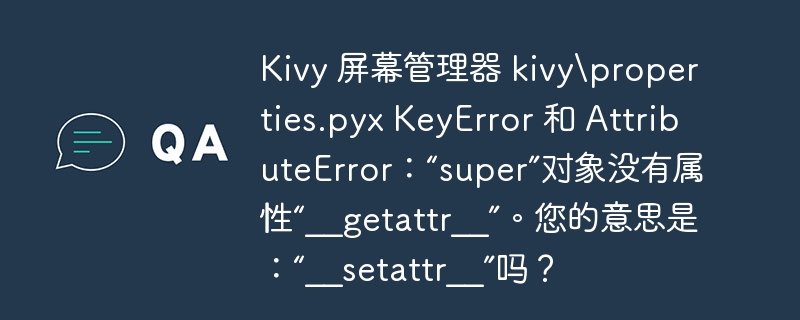Heim >Backend-Entwicklung >Python-Tutorial >Kivy-Bildschirmmanager kivy\properties.pyx KeyError und AttributeError: Das Objekt „super' hat kein Attribut „__getattr__'. Meinten Sie: „__setattr__'?
Kivy-Bildschirmmanager kivy\properties.pyx KeyError und AttributeError: Das Objekt „super' hat kein Attribut „__getattr__'. Meinten Sie: „__setattr__'?
- WBOYWBOYWBOYWBOYWBOYWBOYWBOYWBOYWBOYWBOYWBOYWBOYWBnach vorne
- 2024-02-09 12:39:14713Durchsuche

Ich bin auf ein Problem gestoßen, als ich versuchte, einen Bildschirmmanager mit Kivy zu implementieren. Wie Sie sehen können, ist die „Chat“-ID in main.kv definiert, sodass ich nicht verstehen kann, warum der Fehler auftritt. Ich bin neu bei Kivy und habe noch nie zuvor einen Bildschirmmanager verwendet. Bitte helfen Sie!
app_cleaned.py
from kivy.app import app
from kivy.lang import builder
from kivy.uix.label import label
from kivy.core.window import window
from kivy.uix.screenmanager import screen, screenmanager
from kivy.clock import mainthread
from range_key_dict import rangekeydict
from math import inf
from threading import thread
from powerbot import chatbot
#remove
from kivy.clock import clock
window.size = (500, 500)
class signupscreen(screen):
pass
class mainscreen(screen):
pass
class message(label):
pass
class user:
def __init__(self, years_lifting, weight, height, unavailable_equipment, unavailable_muscle_groups, aim):
# lifting experience classification
expclassdict = rangekeydict({
(0.0, 1.9): 1, # beginner
(2.0, 3.9): 2, # intermediate
(4, inf): 3 # advanced
})
expclass = expclassdict[years_lifting]
# bmi classification
bmiclassdict = rangekeydict({
(0.0, 9.9): 1, # severely underweight
(10.0, 18.5): 2, # underweight
(18.6, 24.9): 3, # healthy weight
(25.0, 34.9): 2, # overweight
(35.0, inf): 1, # severely overweight
})
bmi = weight/(height/100)**2 # calculate bmi
bmiclass = bmiclassdict[bmi]
self.experience_level = expclass
self.bmi_level = bmiclass
self.unavailable_equipment = unavailable_equipment
self.unavailable_muscle_groups = unavailable_muscle_groups
self.aim = aim
class exampleapp(app):
def build(self):
sm = screenmanager()
# load the signup.kv file and add its content to the signupscreen
builder.load_file('signup.kv')
# create the signupscreen instance and add it to the screenmanager
signup_screen = signupscreen(name='signup')
sm.add_widget(signup_screen)
# load the main application screen from main.kv
builder.load_file('main.kv')
main_screen = mainscreen(name='main')
sm.add_widget(main_screen)
return sm
def switch_to_main_screen(self):
self.root.current = 'main'
def __init__(self, **kwargs):
super().__init__(**kwargs)
self.ai = chatbot("powerbot")
def on_start(self):
print("root ids:", self.root.ids)
# assuming you expect 'chat' to be available here, you can print its contents as well
if 'chat' in self.root.ids:
print("chat widget:", self.root.ids.chat)
self.root.current = 'signup'
initial_messages = ["powerbot is initializing, please wait (this could take a minute)"]
for message in initial_messages:
self.system_message(message)
message = "000000"
thread = thread(target=self.background_message_receiver,args=(message,))
thread.start()
self.root.ids.sv.scroll_y = 0
def sign_up(self, years_lifting, weight, height):
# convert input values to appropriate data types (e.g., int, float)
years_lifting = float(years_lifting)
weight = float(weight)
height = float(height)
# create a user object with the provided sign-up details
user = user(years_lifting, weight, height) # pass other sign-up details as needed
self.root.ids.years_lifting_input.text = ''
self.root.ids.weight_input.text = ''
self.root.ids.height_input.text = ''
def background_message_receiver(self, message):
response = self.ai.message_to_bot(message)
self.incoming_message(response)
def send_message(self, message):
self.root.ids.ti.text = ""
if message:
m = message(text=f"[color=dd2020]you[/color] > {message}")
self.root.ids.chat.add_widget(m)
self.root.ids.ti.focus = true
thread = thread(target=self.background_message_receiver,args=(message,))
thread.start()
@mainthread
def incoming_message(self, message):
m = message(text=f"[color=20dd20]powerbot[/color] > {message}")
self.root.ids.chat.add_widget(m)
self.root.ids.ti.focus = true
def system_message(self, message):
m = message(text=f"[color=ffffff]system[/color] > {message}")
self.root.ids.chat.add_widget(m)
self.root.ids.ti.focus = true
# execute
if __name__ == '__main__':
exampleapp().run()
main.kv
<message>:
size_hint: 1, none
text_size: self.width, none
size: self.texture_size
markup: true
<mainscreen>:
boxlayout:
orientation: 'vertical'
padding: 10
scrollview:
id: sv
boxlayout:
id: chat # add the id for the chat messages
spacing: 5
padding: 10
orientation: 'vertical'
size_hint_y: none
height: self.minimum_height
widget: # used as a spacer, push message to bottom
size_hint_y: none
height: sv.height
boxlayout:
size_hint_y: none
height: 40
spacing: 10
textinput:
id: ti
multiline: false
on_text_validate: app.send_message(self.text)
button:
text: 'submit'
size_hint_x: none
width: 75
on_release: app.send_message(ti.text)
Register.kv
<SignupScreen>:
BoxLayout:
orientation: 'vertical'
padding: 10
Button:
text: 'Continue'
size_hint_y: None
height: '48dp'
on_release: app.switch_to_main_screen()
Ich habe hier weitere Fragen zu ähnlichen Problemen gesehen, aber leider beherrsche ich Kivy nicht ausreichend, um die Lösung auf mein spezielles Szenario anzuwenden.
Richtige Antwort
In Ihrer chat id 是在 mainscreen 类中定义的,但您尝试在 exampleapp 的 self.root.ids 中访问它。由于该 id 是在 2ce5072a52f86a18f348fe92d4deb633 规则中定义的,因此您必须通过 mainscreen 实例访问它。一种方法是仅保存对 mainscreen 实例的引用。在 build()-Methode können Sie Folgendes ändern:
# load the main application screen from main.kv
builder.load_file('main.kv')
main_screen = mainscreen(name='main')
sm.add_widget(main_screen)
An:
# load the main application screen from main.kv
builder.load_file('main.kv')
self.main_screen = mainscreen(name='main')
sm.add_widget(self.main_screen)
Dann, in jeder nicht statischen exampleapp 方法内的任何位置,您都可以访问 chat ID, so:
self.main_screen.ids.chat
Das obige ist der detaillierte Inhalt vonKivy-Bildschirmmanager kivy\properties.pyx KeyError und AttributeError: Das Objekt „super' hat kein Attribut „__getattr__'. Meinten Sie: „__setattr__'?. Für weitere Informationen folgen Sie bitte anderen verwandten Artikeln auf der PHP chinesischen Website!

